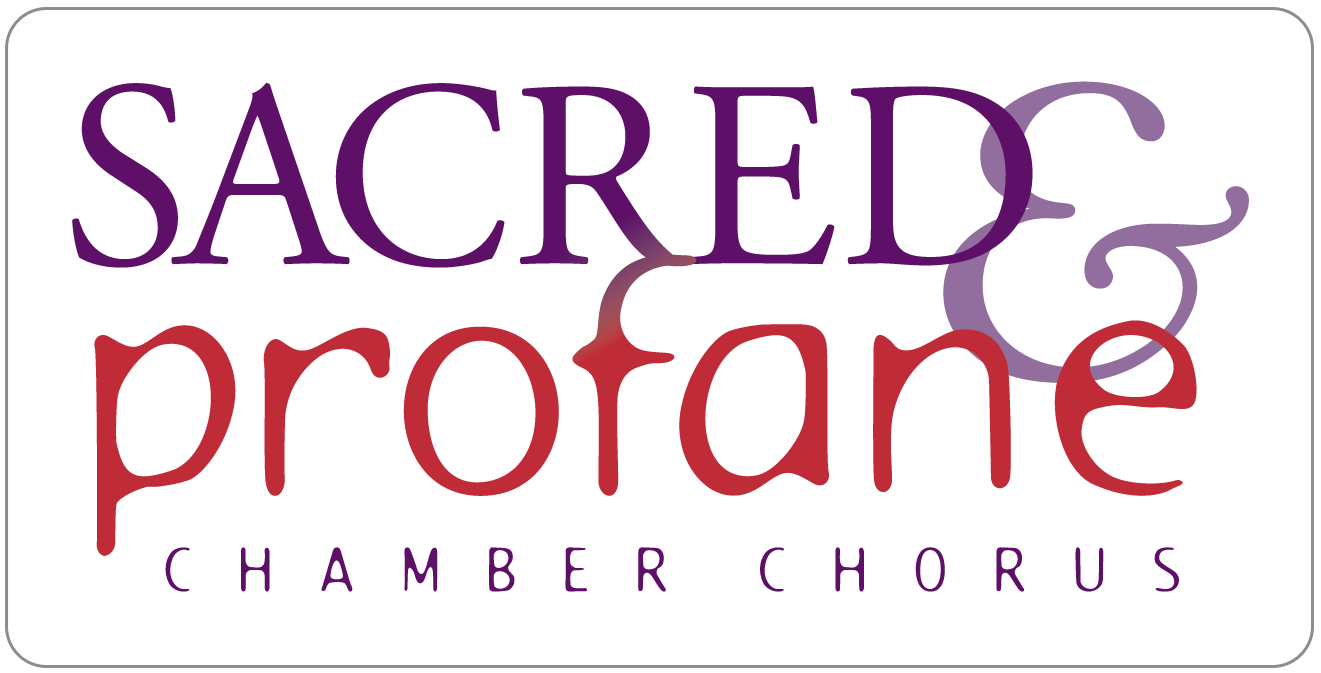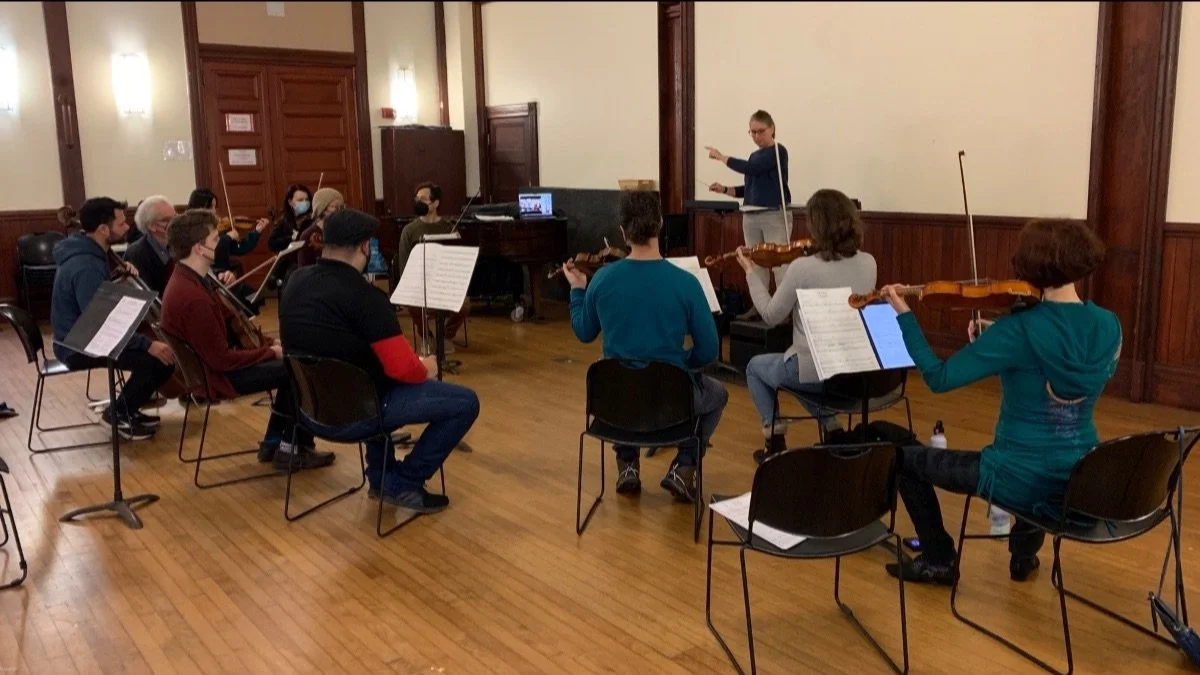from the DIRECTOR'S DESK
Dear Friend of Sacred and Profane,
Three years ago, almost to the day, Sacred and Profane was five days from presenting our concert with strings, featuring the fantastic Circadian String Quartet and fellow local players. I had just returned from the American Choral Directors Association conference and my head and heart were swimming with choral music, my car was packed for that night’s dress rehearsal, and I was so excited to hear the music come to life after wonderful separate rehearsals for strings and singers. And then the lockdown happened – at 4pm on a Monday afternoon, we made the call – there would be no concerts that weekend and, as it turned out, no live concerts for almost two years. But we knew we’d return to this moving and compelling music and I’m thrilled to present our concert to you, at long last, this weekend!
I first began dreaming of a concert for choir and strings when Karin Rehnqvist, the fantastic Swedish composer whose music we frequently perform in our concerts, told me that she was working on a work for string orchestra and eight solo voices, for which she was choosing texts from the same collections of poetry by indigenous poets from various regions that had been the source of Songs From the North, the remarkable four-movement work she composed for us for our fortieth-anniversary concert in May 2018. I was struck by the opportunity to perform a work that was something of a partner to Songs of the North, and asked her if she thought it could be re-conceived for soloists and choir. She liked the idea, and we agreed to discuss it more when the work was complete.
We needed an excellent string orchestra to work with to make this concert a reality. The first group that came to mind was the wonderful local string quartet Circadian, whose first violinist David Ryther is an old friend of mine from our undergraduate days at UC Santa Cruz. David’s remarkable skill, expressive musicality, and commitment to new music is something that is shared by the entire quartet, so I was thrilled when they agreed to partner with us, and recruit a top-rate ensemble of colleagues to complete the orchestra.
Choosing repertoire for a concert for choir and strings was a challenge, as there are many options to consider. Our original program in 2020 included Beethoven’s Elegischer Gesang to celebrate the 250 year anniversary of that composer’s birth. This time, we decided to replace that piece with No Fairytale Here, Zanaida Robles’ powerful work about Ida B. Wells, the suffragist and journalist who exposed the evils of the Jim Crow South. I’m excited to present one of the first performances of this work for mixed choir, strings, and percussion, featuring my college music school friend and master of African percussion Wade Peterson on djembe. It’s been wonderful working more closely with Dr. Robles the past couple of years – she was one of the interview subjects for my recent Masters of Nonprofit Administration capstone project on Access, Diversity, Equity, and Inclusion in Performing Arts Organizations, and I had the opportunity to experience her remarkable music leadership as the director of a choral festival my university choirs participated in this past November. She’s becoming an increasingly sought-after composer and you’ll understand why when you hear this phenomenal work.
I’m excited to return to the music of our own local David Conte, chair of the composition faculty at the San Francisco Conservatory and fellow choir-nerd. David and I have gotten to know each other over the years since my USF University Choir joined a group of ensembles in a performance of his Elegy for Matthew, composed in memory of Matthew Shepard to a text by David’s frequent collaborator, the poet John Stirling Walker (coincidentally, I also met S&P’s phenomenal pianist, Paul McCurdy, in this project). When I discovered David’s September Sun, a multi-movement work that he wrote to commemorate the one-year anniversary of the September 11th attacks, also to a text of Stirling Walker, I knew I found an ideal work for our concert. This remarkable piece contains soaring lyrical melodies alongside the excited energy of New York City. We’ve invited members of the UC Alumni Chorus to join us on this piece, and some S&P singers will join that choir in a performance of the same work in the UCAC concert this April.
We needed something lighthearted to compliment the heavier works in the concert. Eric Whitacre’s Five Hebrew Love Songs for choir and string quartet fit the bill beautifully. Whitacre composed this piece as a graduate school student at Julliard, setting brief love poems by his then girlfriend and future wife, the Israeli soprano Hila Plitmann. The work was originally composed for Plitmann to sing with piano and solo violin, and Whitacre later arranged for a variety of vocal and instrumental combinations. These sweet songs are a lovely testament to new love in its early moments of delight and discovery.
Back to Karin Rehnqvist’s work for voices and strings. When she completed the piece, Day is here, and it had received its premiere in Stockholm, she sent me the score. We worked together to determine which parts could work well for the full ensemble, and which would be best in solo voices. Making this a reality with Sacred and Profane, our eight remarkable soloists, and the string orchestra in our rehearsals over the past couple of months has been thrilling and hugely rewarding for me. It is a demanding and moving work about the birth of the planet and our current situation confronting climate change, using Native American and other indigenous texts, as well as a beautiful Swedish hymn, to celebrate our abiding relationship with the natural world. Knowing Karin as I do, a person who spends weeks at a time on backpacking trips with her husband Hasse, and whose home outside of Stockholm sits perched on a wooded hill above a large and beautiful lake, I know that the health of our planet concerns her greatly, as it does all of us.
I hope to see you at this wonderful concert, full of variety, with poignancy and joy, depth and levity!
Warmly,
Rebecca
March 1, 2022


